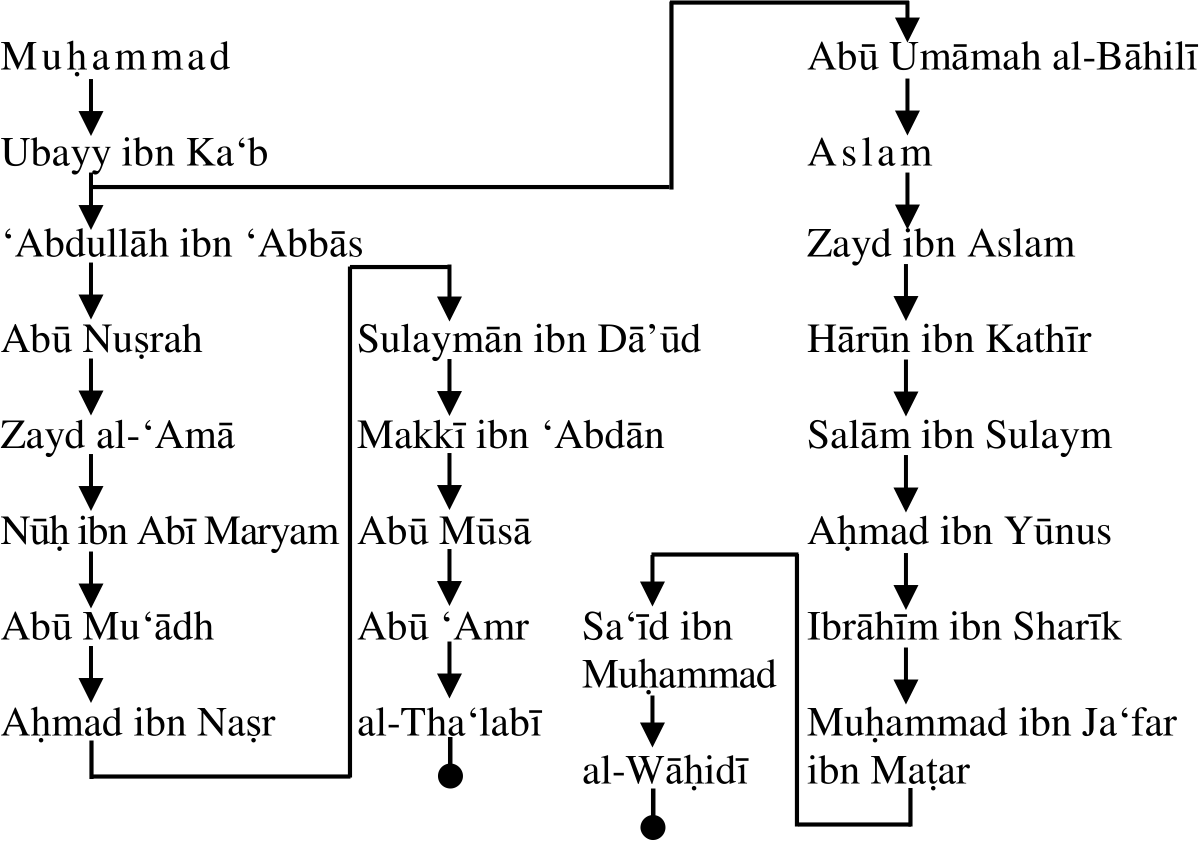|
أخبرنا أبو عمرو
الفراتي قال أخبرنا أبو موسي قال أخبرنا مكي بن عيدان قال
حدثنا سليمان بن داود قال حدثنا أحمد بن نصر قال حدثنا أبو
معاذ عن أبي عصمة نوح بن أبي مريم عن زيد العمي عن أبي نصرة عن
ابن عباس عن أبي بن كعب عن النبي صلي اللّٰه عليه وسلم قال من
قرأ المعوذتين فكأنما قرأ الكتب التي أنزلها اللّٰه تعالي
كلها.
Ubayy ibn Ka‘b reported from the Prophet
(sws) that he said: “He who read the mu‘awwidhatayn, it is
as if he read all the books revealed by God, the Exalted.”
Following is the schematic illustration
of the isnad of this narrative’s variants:

Following is the jarh recorded by al-Mizzi
on Zayd al-‘Ama: Yahya ibn Ma‘in says that he is la shay’
and another opinion ascribed to him is salih and still
another opinion about attributed to him is that yuktabu
hadithuhu da‘if; Abu Zur‘ah says that he is laysa bi qawi
wahi al-hadith da‘if; Abu Hatim says yuktabu hadithuhu wa la
yuhtajju bihi; Abu Da’ud’s opinion about him is laysa bi
dhak and at another instance has said he has only heard good
things from him; al-Nasa’i regards him to be da‘if; al-Daraqutni
calls him salih.
Ibn Hajar says that he is da‘if.
Ibn Hibban says that in his view it is
not permissible adduce from his narratives except for
corroboration and he would narrate from Anas things that had
no basis; Ahmad ibn Zuyahr says that he has heard Yahya ibn
Ma‘in say that Zayd’s narratives are not permissible.
Ibn al-Jawzi records that according to Abu Zur‘ah, he is
da‘if wahi al-hadith.
Ibn Sa‘d regards him to be da‘if al-hadith.
Regarding Nuh ibn Abi Maryam (d. 173 AH),
Ibn Hibban records: he is among those who mixes up isnads
and reports from trustworthy narrators what is not reported
from reliable narrators and it is not permissible to narrate
from him under any circumstances.
Al-Mizzi records: laysa bi shay’ wa la yuktabu hadithuhu;
Abu Zur‘ah says that he is da‘if al-hadith; Abu Hatim,
Muslim ibn al-Hajjaj, Abu Bishr al-Dulabi and al-Daraqutni
regard him to be matruk al-hadith; al-Bukhari calls him
munkar al-hadith and at another instance says that he is
dhahib al-hadith jiddaṇ; the opinions of al-Nasa’i recorded
about him are laysa bi thiqah wa la ma’mun and laysa bi
thiqah wa la yuktabu hadithuhu and saqata hadithahu; Abu
‘Abdullah al-Hakim says that he has fabricated the
narratives of the blessings of reading surahs of the Qur’an;
Ibn ‘Adi says that most of his narratives do not have
corroboration and that in spite of his weakness his
narratives will be written for corroboration.
Ibn Hajar writes: kadhdhabuhu fi al-hadith;
Abu ‘Ali al-Ni#saburi says that he is a liar; al-Hakim says
that he is dhahib al-hadith; Abu Sa‘id al-Naqqash says that
he narrates fabricated narratives; al-Saji regards him to be
matruk al-hadith; al-Khalili says that everyone is united in
regarding him to be weak and a liar.
Abu Hatim and al-Dhahabi say that Harun
ibn Kathir is majhul.
Ibn ‘Adi says that he is not known since the only person to
narrate from him is Zayd ibn Aslam. He has narrated a
narrative regarding the blessings of reading Qur’anic surahs
from Zayd ibn Aslam who reports from his father Aslam who
reports from Abu Umamah al-Bahili who reports from Ubayy who
reports from the Prophet (sws). This narrative is ghayr
mahfuz.
Following is the jarh recorded by al-Mizzi
on Salam ibn Sulaym (d. 177 AH): according to Ahmad ibn
Hanbal, he narrates ahadith munkarah; the opinions
attributed to Yahya ibn Ma‘in are: laysa bi shay’, da‘if la
yuktabu hadithuhu, lahu ahadith munkarah; ‘Ali ibn al-Madini
and Abu Zur‘ah regard him to be da‘if; Muhammad ibn
‘Abdullah ibn ‘Ammar al-Musili says that he is laysa bi
hujjah; Ibrahim ibn Ya‘qub al-Juzjani says that he is ghayr
thiqah; Abu Hatim says da‘if tarakuhu; the opinions
attributed to al-Bukhari about him are yatakallamuna fihi
and tarakuhu; al-Nasa’i regards him to be matruk and laysa
bi thiqah wa la yuktabu hadithuhu; Abu al-Qasim al-Baghawi
says that he is da‘if al-hadith jiddaṇ; ‘Abd al-Rahman ibn
Yusuf ibn Khira#sh regards him to be matruk and at another
instance calls him kadhdhab.
Ibn Hibban says that he narrates fabricated narratives from
trustworthy people as if they are reliable to them.
_________
|